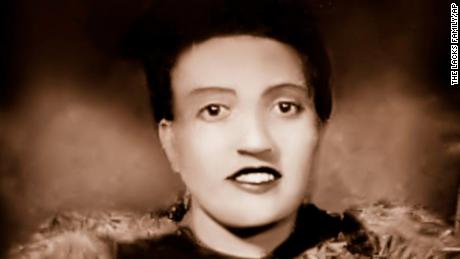The World Health Organization honors the late Henrietta Lacks for her contributions to scientific research

Lacks, a Black woman, was suffering from cervical cancer when she was being treated at the Johns Hopkins Hospital in 1951. A surgeon removed cells from her cervix without her consent during a procedure and that sample enabled a doctor at the hospital to create the first human cell line to reproduce outside the body.The cell line, now known as HeLa cells, allowed scientists to experiment and create life-saving medicine including the polio vaccine, in-vitro fertilization and gene mapping as well as helped advance cancer and AIDS research.Lacks, 31, died that same year from cancer, but her influence on the medical science field lived on, leading to the Several of Lacks’ grandchildren, great-grandchildren and other family attended the award ceremony at the WHO office in Geneva. Her 87-year-old son, Lawrence Lacks, Sr., accepted the award on her behalf. “We are moved to receive this historic recognition of my mother, Henrietta Lacks — honouring who she was as a remarkable woman and the lasting impact of her HeLa cells. My mother’s contributions, once hidden, are now being rightfully honored for their global impact,” Lawrence Lacks said in a statement.”My mother was a pioneer in life, giving back to her community, helping others live a better life and caring for others,” he added. “In death she continues to help the world. Her legacy lives on in us and we thank you for saying her name — Henrietta Lacks.”Family sues biotechnical company for nonconsensual use of her cellsAt the time of Lacks’ procedure, taking cells from people without their consent wasn’t against protocols. Earlier this month, Lacks’ family filed a lawsuit against Thermo Fisher Scientific Inc. for unjust enrichment from the nonconsensual use and profiting from her tissue sample and cell line.The lawsuit alleges that Thermo Fisher Scientific is knowingly profiting from the “unlawful conduct” of the Johns Hopkins doctors and that its “ill-gotten gains rightfully belong to Ms. Lacks’ Estate.”It argues that the company is “making a conscious choice to sell and mass produce the living tissue of Henrietta Lacks, a Black woman, grandmother, and community leader, despite the corporation’s knowledge that Ms. Lacks’ tissue was taken from her without her consent by doctors at Johns Hopkins Hospital and a racially unjust medical system.”While the origin of HeLa cells was not clear for years, Lacks’ story has become widely known in the 21st century. It was the subject of a best-selling book, “The Immortal Life of Henrietta Lacks,” which was published in 2010, and a subsequent movie of the same name starring Oprah Winfrey. The US House of Representatives has recognized her nonconsensual contribution to cancer research, and John Hopkins holds an annual lecture series on her impact on medicine.The lawsuit claims that with this wide recognition, there is no way that Thermo Fisher Scientific could say it didn’t know the history behind its products containing HeLa cells and points to a page on the company’s website that acknowledges the cells were taken without Lacks’ consent. According to the lawsuit, there are at least 12 products marketed by Thermo Fisher that include the HeLa cell line.Thermo Fisher Scientific generates annual revenue of approximately $35 billion, according to its website. CNN has reached out to the company for comment.CNN’s Taylor Romine contributed to this report.






